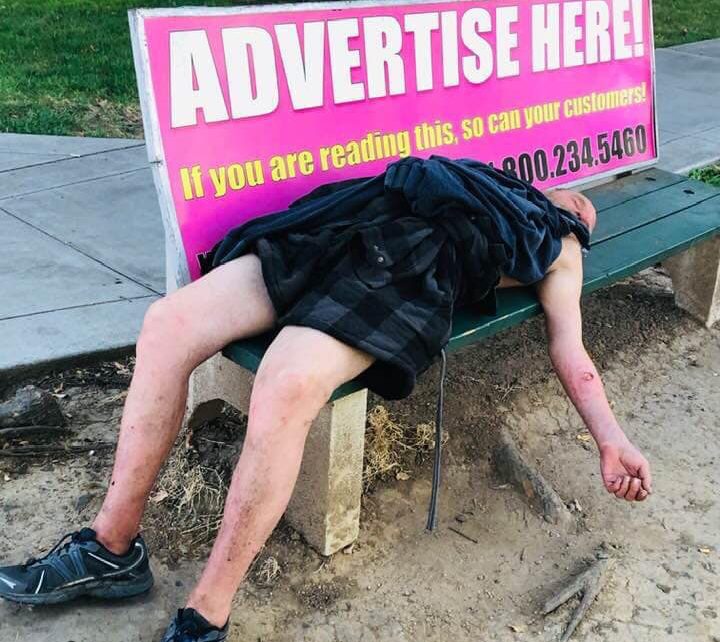
Sacramento homeless man passed out near Sacramento City College and a restaurant. (Photo: Katy Grimes for California Globe)
OPINION: Arrest And Jail, Critical Tools On The Road To Recovery
Limited, hard-boundary encounters with the judicial system have helped many people snap out of a life of drugs and alcohol
By Dave Marlon, October 22, 2023 1:52 pm
Many people begin their journey to sobriety in handcuffs. For many, that arrest represented the end of one life and the beginning of another. I am humbled and awestruck to have hit my 18th year of sobriety. I attend a home group with many professionals with more time clean and sober than I and more than half of them came into sobriety in handcuffs.
While it is widely understood that incarceration isn’t a solution to addiction, physically separating a person from their behavior, even for a short period of time via enforcement intervention, can be an integral part of the process. Each year, many thousands of people walk the journey of recovery. Each and every one of them reports back a story similar to my own. For some, their rock bottom—the end of their life as an addict—was not an arrest, but some other tragic or shocking moment. For many of those thousands each year, it will be a negative encounter with law enforcement that marks the turning point in their life.
No one, least of all me, would suggest that the arrest is what got me sober. It was certainly the shock I needed to see my life with a different perspective, one that let me know I needed a change. It was what followed and continues to this day—the meetings, working the Twelve Steps, group therapy and other forms of treatment that ultimately allowed me to reclaim my sobriety and my life.
Likewise, no one is suggesting that jailing homeless individuals is going to solve the nationwide increase in homelessness that is approaching crisis levels. Still, we must acknowledge the facts: the vast majority of homeless individuals are homeless because they have a substance use disorder and a likely co-occuring serious mental illness. The Substance Abuse and Mental Health Services Administration estimates 80% of homeless individuals suffer from a substance use disorder.
Centering the voices of those in recovery means acknowledging that the journey for the vast majority of us comes as a result of a tough life event. Ultimately, the consequences that come from passing reasonable boundaries set by the law have helped more people get sober than they have hurt.
The idea that we should not be able to arrest homeless individuals for certain behavior is indicative of an ignorance of how life on the street works—homeless encampments are often lawless, where a select few criminals are left to prey on the wider community. Sexual assault is not uncommon. Hygiene is nonexistent. Without reasonable protections for safety and sanitation, city life would quickly degenerate into something unlivable for housed citizens.
It’s absolutely correct to say that there is no law enforcement solution for what is ultimately a complex social condition that ends up with a person living in the streets—but it’s also true that no one is seriously suggesting arrest and jail as a solution to homelessness.
Rather, certain laws have been tailored to help local authorities intervene to help individuals return to sobriety. Limited, hard-boundary encounters with the judicial system have helped many people snap out of a life of drugs and alcohol, helping graduate them from the streets back to a life of employment, regular and consistent housing, sobriety and social stability.
At Vegas Stronger, we work with people suffering from homelessness in Las Vegas, offering substance use disorder treatment to anyone who needs it in Las Vegas. We recruit primarily from homeless shelters. I have been involved in recovery for the last 25 years and worked with homeless individuals both with and without municipal camping bans and other laws designed to put a lid on homelessness.
I can state unequivocally, in my experience, the localities that exercise judicious use of law enforcement power to target homeless individuals for treatment and services while keeping the streets clean, safe and useable for the rest of us have better outcomes–both for homeless individuals who are in desperate need of treatment and care and communities who need useable public spaces, streets and parks–and begin to thrive.
While jail isn’t a solution to addiction, physically ceasing the behavior via enforcement can be an integral part.
- OPINION: Arrest And Jail, Critical Tools On The Road To Recovery - October 22, 2023





A lot of trailer courts and SRO places have been shut down. (North of downtown). While you want safe sanitary housing- dumpy housing is better than encampments.
You are absolutely correct Mr. Marlon. As a multiple 51/50 recipient in the streets of Los Angeles, it took a two week stint in Whittier, CA to finally get a somewhat proper diagnosis of bipolar II and in a psychotic state and a chance. Against my will yes. Did that and many other instances to save my life of being committed YES!
It is not compassionate to leave people on the streets who are held captive by brains that are not functioning properly wether drugs, alcohol, unaddressed trauma to live in the shadows or to live as human trash that people develop cognitive dissonance to.
That photo reminds me of myself. A very low point on a bus stop bench under an overpass. Took everything I could get my hands on to die and not be a burden anymore. Didn’t want the housekeepers to find me at the now demolished Travel Lodge on Century and Aviation I think. EMS found me and 15 years later I’m here. Want the same for so many just like you are speaking on.
Intervention, accountability and true compassion vs enabling where everyone suffers.
I appreciate your testimony.